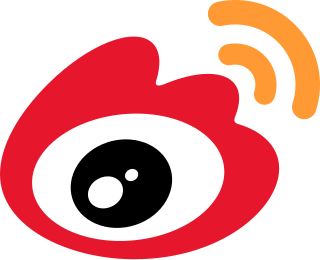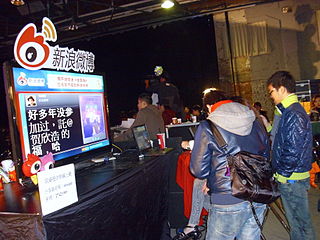
Celebrity is a condition of fame and broad public recognition of a person or group as a result of the attention given to them by mass media. An individual may attain a celebrity status from having great wealth, their participation in sports or the entertainment industry, their position as a political figure, or even from their connection to another celebrity. 'Celebrity' usually implies a favorable public image, as opposed to the neutrals 'famous' or 'notable', or the negatives 'infamous' and 'notorious'.
China censors both the publishing and viewing of online material. Many controversial events are censored from news coverage, preventing many Chinese citizens from knowing about the actions of their government, and severely restricting freedom of the press. China's censorship includes the complete blockage of various websites, apps, video games, inspiring the policy's nickname, the "Great Firewall of China", which blocks websites. Methods used to block websites and pages include DNS spoofing, blocking access to IP addresses, analyzing and filtering URLs, packet inspection, and resetting connections.

China has been on the Internet intermittently since May 1989 and on a permanent basis since 20 April 1994, although with heavily censored access. In 2008, China became the country with the largest population on the Internet and, as of 2024, has remained so. As of July 2023, 1.05 billion use internet in China.

Sina Corporation is a Chinese technology company. Sina operates four major business lines: Sina Weibo, Sina Mobile, Sina Online, and Sinanet. Sina has over 100 million registered users worldwide. Sina was recognized by Southern Weekend as the "China's Media of the Year" in 2003.
The Great Firewall is the combination of legislative actions and technologies enforced by the People's Republic of China to regulate the Internet domestically. Its role in internet censorship in China is to block access to selected foreign websites and to slow down cross-border internet traffic. The Great Firewall operates by checking transmission control protocol (TCP) packets for keywords or sensitive words. If the keywords or sensitive words appear in the TCP packets, access will be closed. If one link is closed, more links from the same machine will be blocked by the Great Firewall. The effect includes: limiting access to foreign information sources, blocking foreign internet tools and mobile apps, and requiring foreign companies to adapt to domestic regulations.

Livestreaming, live-streaming, or live streaming is the streaming of video or audio in real time or near real time. While often referred to simply as streaming, the real time nature of livestreaming differentiates it from other forms of streamed media, such as video-on-demand, vlogs, and YouTube videos.

An internet celebrity is an individual who has acquired or developed their fame and notability on the Internet. The growing popularity of social media provides a means for people to reach a large, global audience. Internet celebrities are often found on large online platforms such as YouTube, Instagram, and TikTok, which primarily rely on user-generated content.

Weibo, previously Sina Weibo, is a Chinese microblogging (weibo) website. Launched by Sina Corporation on 14 August 2009, it is one of the biggest social media platforms in China, with over 582 million monthly active users as of Q1 2022. The platform has been a huge financial success, with surging stocks, lucrative advertising sales and high revenue and total earnings per quarter. At the start of 2018, it surpassed the US$30 billion market valuation mark for the first time.

Sports marketing as a concept has established itself as a branch of marketing over the past few decades; however, a generally accepted definition does not exist. Academicians Kaser and Oelkers define sports marketing as 'using sports to market products'. It is a specific application of marketing principles and processes to sport products and to the marketing of non- sports products through association with sport.
Weibo is a general term for microblogging, but normally understood as Chinese-based mini-blogging services, including social chat sites and platform sharing.

Wang Feifei, also known professionally as Fei, is a Chinese singer and actress. She was a member of the South Korean girl group miss A from the group's debut in 2010 until its disbandment in 2017. She debuted as a solo artist in 2016 in Korea with the mini album "Fantasy". After departing Korea in 2018, Fei has since pursued her solo career in China. In 2021, Fei released Chinese mini album "Fearless 不霏", an independent production by Wang Feifei Studio. In the summer of 2023, with roles in My Marvelous Fable (夏日奇妙书) and One and Only (热烈), Fei continues to grow her credentials in acting.

Social media and television have a number of connections and interrelationships that have led to the phenomenon of Social Television, which is an emerging communication digital technology that centers around real-time interactivity involving digital media displayed on television. The main idea behind Social Television is to make television consumption a more active content experience for audiences. In the 2010s, social media platforms and websites allowed for television shows to be accessed online on a range of desktop and mobile computer devices, smartphones and smart TVs that are still evolving today in the 2020s. Alongside this, online users can use social media websites to share digital video clips or excerpts from TV shows with fellow fans or even share an entire show online. Many social media websites enable users to post online comments on the programs—both negative and positive—in a variety of ways. Viewers can actively participate while watching a TV program by posting comments online, and have their interactions viewed and responded to in real time by other viewers. Technologies such as smartphones, tablets, and laptop computers allow viewers to watch downloaded digital files of TV shows or "stream" digital files of TV shows on a range of devices, both in the home and while on the go. In the 2020s, many television producers and broadcasters encourage active social media participation by viewers by posting "hashtags" on the TV screen during shows. These hashtags enable viewers to post online comments about the show, which may either be read by other social media users, or even, in some cases, displayed on the screen during the show.

Whalerock Industries is an American media and technology company. Based in West Hollywood, Whalerock partners with public figures and brands to create, build and operate direct-to-consumer multi-media apps which integrate music, video, live streaming, e-commerce, and gaming. Whalerock's partners include Sirius XM, Howard Stern, Warner Bros., Pottermore, MTV, Comedy Central, CMT, MSN, Microsoft, the Kardashian/Jenner sisters, and Tyler the Creator. The multi-media apps were described by Wired as "promising a new kind of interaction—one with more control for celebrities and more content for super fans."

WhoSay is an American social media service and branding platform for celebrities and their fans. Founded in Los Angeles in 2010, with financing by Creative Artists Agency (CAA), Amazon.com and other investors, it is notable for allowing its users to retain ownership rights over the content that they post to their accounts, through copyright branding, and for enabling users to post content to other social media sites like Twitter, Facebook, Instagram and Tumblr simultaneously. WhoSay describes itself as a "social celebrity magazine" whose editorial team keeps its users informed about the latest celebrity and entertainment news.

Jukin Media, Inc. is an entertainment company that operates by identifying shareable or otherwise compelling user-generated videos, negotiating with the video owners, and then licensing the videos for third-party use and/or featuring the videos in its own productions. The company was founded in 2009 by Jonathan Skogmo, Aldo Carrascoso, and Josh Entman and is headquartered in Los Angeles.
As of 2010, the largest internet enterprises in China were Baidu, Tencent, and Alibaba followed by Soso, Sogou, Bing, and Yahoo. In March 2010, Google which had been in the list from 2000, was forced to pull out from China because of a heated dispute with the Chinese Government regarding the censoring of search engine results.
Sina Sports is a Chinese digital sports media platform that provides live sporting events, highlights, news, discussion forums and other related sports content, primarily targeted at Chinese communities around the world. It is a subsidiary of Chinese internet company Sina.com and was established in 1998 as China's first online sports platform.
The wanghong economy [internet celebrity economy] refers to the Chinese digital economy based on influencer marketing through social media platforms. Wanghong is the Chinese term for internet celebrity. Chinese wanghong celebrities attract the attention of internet users, which can translate into profit through e-commerce and online advertising.

The National Basketball Association (NBA) is one of the fastest growing sports leagues in the United States. In 2017, NBA broadcast game ratings had increased by 32% since the previous season, the 2017 NBA Finals had 20.4 million total viewers with an additional 434,000 digital streaming viewers in 215 countries and territories, in 49 languages. The growth of NBA viewership is related to its path to globalization and their digital marketing campaigns, which has allowed the NBA to expand their brand awareness and sponsorship deals across borders. The NBA started its globalization strategy by holding international exhibition games between NBA teams and international teams in different countries, as well as inviting over 110 international players to join the league.

The Xiao Zhan boycott incident, also known as the 227 incident, is a 2020 online controversy that originated between the fans of Chinese actor Xiao Zhan and Archive of Our Own users in Mainland China. The incident started when the internet censorship system known as the Great Firewall of China blocked the fan fiction publishing platform Archive of Our Own in the country, due to concerns about the actor's fanbase regarding vulgar and explicit content on the website.














